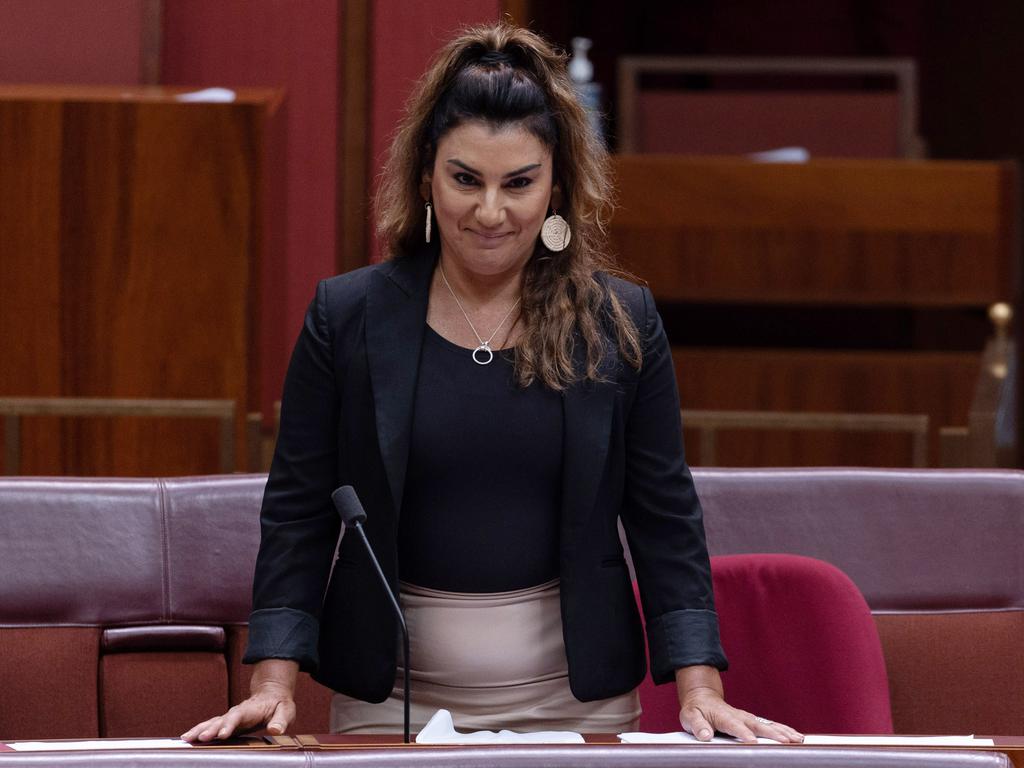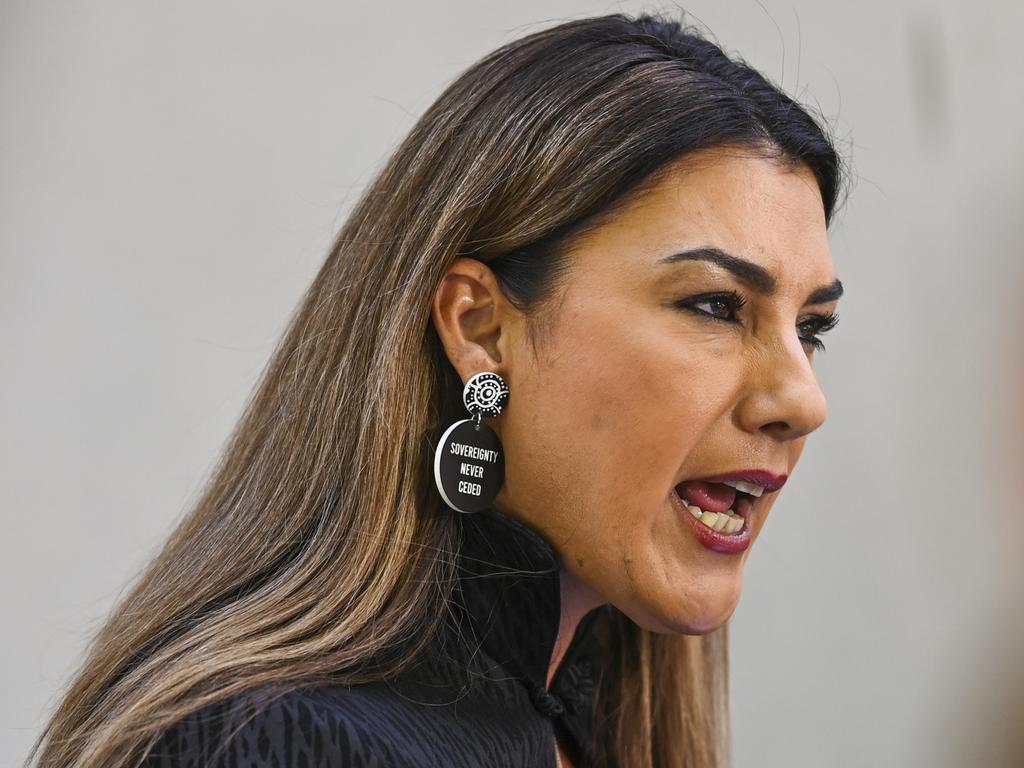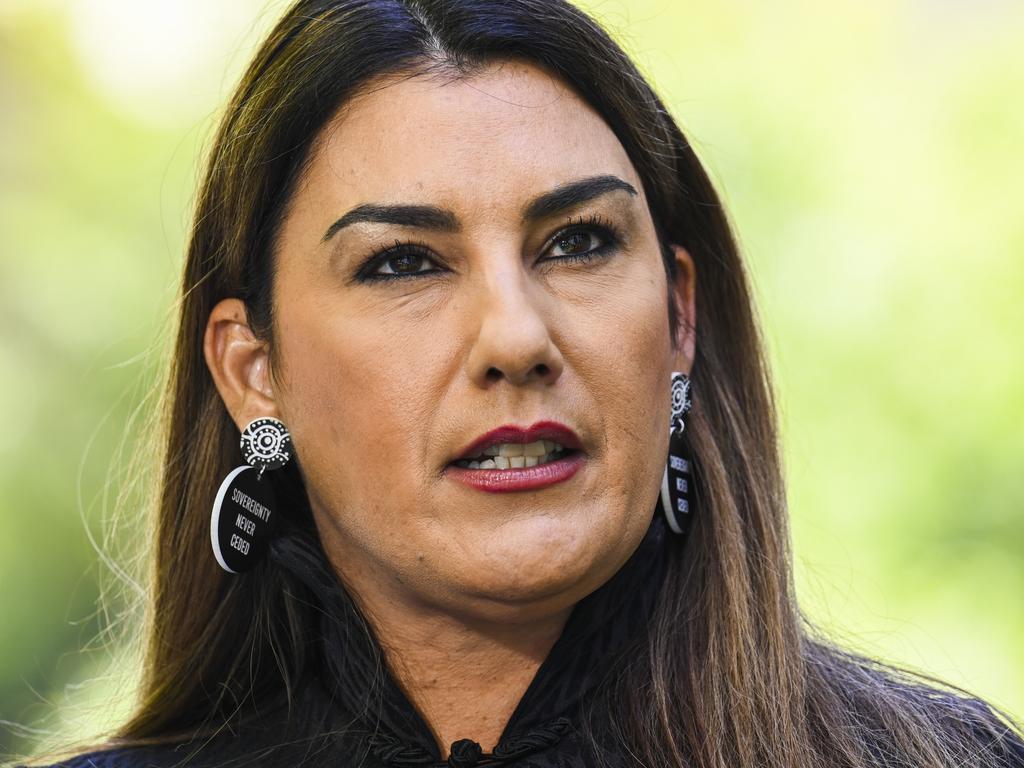
We profess to be concerned about integrity yet are paralysed before huge and blatant breaches of integrity. The bizarre feature of Lidia Thorpe’s defection is the near universal recognition across the political system that this is wrong and should not be allowed.
What should be done? The answer seems obvious – there should be a referendum to amend the Constitution specifying that where a senator changes the allegiance on which they were elected they should resign from the Senate and be replaced by a senator from the party they represented on being elected.
In this case Thorpe would be obliged under the Constitution to resign and be replaced by another senator from the Greens. Surely this is preferable to the current situation where Thorpe resigned from the Greens to sit as an independent and represent what she calls the “black sovereign movement” – a different political movement.
Thorpe has served only nine months of a six-year Senate term. She was elected not in her own right; she was elected on the Greens party ticket. Yet she will now sit and vote in the Senate presumably for the next five years representing another cause, apparently with impunity.
What support would such a referendum have? It would win support from the Labor Party, the Liberal Party, the Nationals and the Greens along with support from the media. Given their focus on integrity the teals would feel obliged to support it. How could they not?
This opens a far bigger window. It exposes the folly of our political system in largely ignoring the Constitution when practical, consensus, clearly explained referendums could be put attracting cross-party and near universal support leading to actual success in achieving constitutional changes.
This is not an argument against putting a republic referendum in 1999 or a voice referendum in 2023. Sometimes governments have an obligation to seek far-reaching changes to our national compact or our governance – both the republic and the voice fit this category. Because these changes to the Constitution are fundamental, it means consensus or bipartisanship is extremely difficult and success becomes a near-herculean task.
If the voice referendum is defeated later this year it will ignite a rethink on Australia’s approach to referendums. Our mindset will need to change. We should recall that the last three successful referendums, carried in 1977, were modest proposals with extremely wide backing – for a casual Senate vacancy to be filled from the same party; allowing people from the territories to vote at referendums; and a retirement age of 70 years for judges.
Coming to grips with the chopping and changing in Senate allegiances in recent parliaments, notably during the 2016-19 parliament, is a bewildering process. It largely casts a shadow of shame over our parliament and public accountability, and reveals a situation that calls for reform.
Above all, it documents the mentality of senators who feel entitled to follow their self-interested preferences and political conveniences over the party on which they were elected.
In 1996 long-serving Labor senator Mal Colston resigned from the ALP but remained in the Senate, often supporting Coalition policy. John Madigan, elected as a DLP senator, resigned to become an independent and later launched his own party. When Meg Lees lost the leadership of the Australian Democrats she quit the party in 2002 but stayed in the Senate.
In 1997 Cheryl Kernot was an exception – she quit the Australian Democrats to join the ALP but resigned from the Senate.
During the 2013-16 term both Jacqui Lambie and Glenn Lazarus, elected as Palmer United Party senators, found their situation unacceptable and resigned. Lambie sat as an independent and then formed the Jacqui Lambie Network. Lazarus sat as an independent and then formed his own party. But the pace of change intensified after the 2016 election in conjunction with the section 44 citizenship fracas.
In 2017 long-serving Liberal senator Cory Bernardi quit the party to form the Australian Conservatives. In 2017 Fraser Anning was selected as a One Nation senator to fill a One Nation vacancy, fell out with Pauline Hanson and sat as an independent, then joined Bob Katter’s Australian Party but was thrown out a short time later, sat as an independent, then formed his own party. Steve Martin was elected to the Senate on a recount after Lambie had to stand aside due to the eligibility issue, but after a conflict with Lambie he sat as an independent and later a National.
Rod Culleton was elected as a One Nation senator but resigned to sit as an independent before he was found to be ineligible. Tim Storer was elected on a count-back on a Nick Xenophon Team ticket but by the time he was declared elected he had left the party and sat as an independent. One Nation senator Brian Burston fell out with Hanson and joined Clive Palmer’s United Australia Party. Lucy Gichuhi arrived as a Family First senator, became an independent, then a Liberal.
In August 2020 senator Rex Patrick from Centre Alliance began sitting as an independent.
In her valedictory speech in 2022, Country Liberal Party senator Sam McMahon acknowledged her resignation from the CLP earlier that year. In February 2023 Thorpe advised she would leave the Greens and sit as an independent.
This extended saga is an insult to the Australian parliament. The problem was exacerbated during the period of the dual-citizenship trauma when a number of senators had to resign or stand down and were replaced. Yet changing allegiances has been a problem both before and after the citizenship issue.
Each of the above mentioned cases is unique; the merits obviously vary in relation to each. The fact, however, is that the Senate voting system guarantees a large crossbench made up of minor parties and independents. This group often holds the balance of power. That means it can decide what becomes the law in Australia. Don’t think these parties don’t matter; they matter mightily.
The Fraser government’s 1977 referendum offers the way forward. This injected the role of political parties into the Constitution and established the principle that a casual vacancy must be filled by a senator from the same party – the same principle could apply once senators switching parties are obliged to resign.
There are downsides to this proposal – it gives more power to parties, which could threaten senators with party expulsion and therefore exclusion unless they toed the line. Critics say this limits parliamentary freedom and discretion. To an extent that’s true. Yet surely the bigger problem is the impunity with which senators can pursue their self-interest and flout the democratic foundation on which they were elected.
Creating a new politics based on modest referendum proposals that must have across-the-board party backing should become the future – if the voice goes the way of the republic.








For how much longer will the Australian Senate be allowed to abuse our democracy, mock integrity in representation and become the vehicle for self-interested exploitation by senators who change their party alignment without any penalty or accountability?